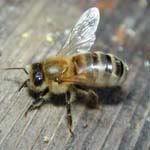
Leaked document shows EPA allowed bee-toxic pesticide despite own scientists’ red flagsSo... our food and the bees we rely on to help make that food are not as important as the corporations which make the pesticide?
An internal EPA memo released Wednesday confirms that the very agency charged with protecting the environment is ignoring the warnings of its own scientists about clothianidin, a pesticide from which Bayer racked up €183 million (about $262 million) in sales in 2009.The short answer is yes.
Clothianidin has been widely used on corn, the largest U.S. crop, since 2003. Suppliers sell seeds pre-treated with it. Like other members of the neonicotinoid family of pesticides, clothianidin gets "taken up by a plant's vascular system and expressed through pollen and nectar," according to Pesticide Action Network of North America (PANNA), which leaked the document along with Beyond Pesticides. That effect makes it highly toxic to a crop's pests -- and also harmful to pollen-hoarding honeybees, which have experienced mysterious annual massive die-offs (known as "colony collapse disorder") here in the United States at least since 2006.
The colony-collapse phenomenon is complex and still not completely understood. While there appears to be no single cause for the annual die-offs, mounting evidence points to pesticides, and specifically neonicotinoids (derived from nicotine), as a key factor. And neonicotinoids are a relatively new factor in ecosystems frequented by honeybees -- introduced in the late 1990s, these systemic insecticides have gained a steadily rising share of the seed-treatment market. It does not seem unfair to observe that the health of the honeybee population has steadily declined over the same period.
According to PANNA, other crops commonly treated with clothianidin include canola, soy, sugar beets, sunflowers, and wheat -- all among the most widely planted U.S. crops. Bayer is now petitioning the EPA to register it for use with cotton and mustard seed.
H/t to mahakal for the link.
5 comments:
Of course one advantage of using neonicotinoid pesticides on our corn is for people who are trying to stop smoking tobacco. Instead, just eat more corn!
Corn will be the death of us. High fructose corn syrup, ethanol....
Yeah, they got rid of HFCS...or rather, they just call it corn sugar now.
And did you hear, Sweet'n'Low may make a comeback!
btw i haz a new blog
Couldn't make your link work, but shortened it to http://mahakal.tumblr.com/. And cool!
And not only corn sugar/ high fructose and Sweet'n'Low... but maybe even DDT to fight those evil bed bugs!! Great to live in the 1940s!
Post a Comment